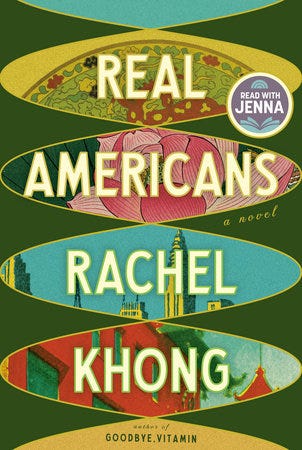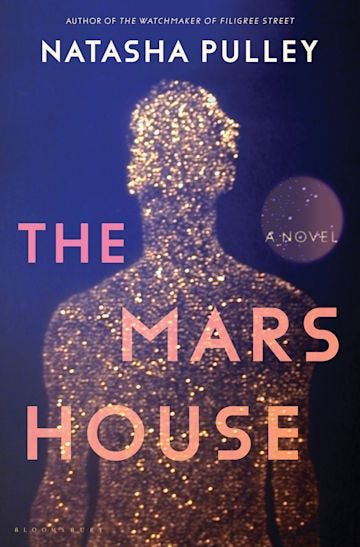Three Great Books #34
This edition's inadvertent theme: immigrants, outsiders, and assimilation.
Real Americans, by Rachel Khong
I love a good multigenerational family saga, and this one packs a punch. The first section centers on Lily, who is an unpaid intern in New York in 1999 when she meets and falls in love with Matthew, a rich kid. Lily, whose scientist parents immigrated from China, had a very different upbringing, but the two overcome their differences, get married, and have a son. When the in-laws spend time together after the baby’s birth, we get our first hint that they may have known each other well before their children got together. The circumstances of that connection aren’t explained before the novel jumps forward to 2021, telling the story of Lily and Matthew’s son Nick. He’s living in Washington with his mother; his father isn’t around, the reasons for which are another mystery. But Nick is understandably curious about his dad, and when the opportunity comes to meet him, he takes it. The final section is set in 2030, told through the perspective of Lily’s mother May, who survived the Cultural Revolution in China and made it to the U.S. under circumstances that Lily never fully understood. May is now living in San Francisco and estranged from her daughter when she makes contact with Nick, who works at a tech startup. This novel covers a lot of ground, but the central question is one of the eternal ones: how do we become who we are?
The Gathering, by C.J. Tudor
If “True Detective: Night Country” made you crave more dark, cold, scary stories, this is for you. There’s been a murder in Deadhart, Alaska, and because of the condition of the teenage boy’s body, the culprit seems clear: a vampyr. The species was long-feared and is now protected by federal legislation — unless a vampyr is proven to have attacked a human. (Predictably, their protected status has become part of the culture war.) There’s a group of vampyrs living nearby in a community known as the Colony, and the local citizens are eager for authorities to authorize a cull, which would let them hunt and kill all of them. Barbara Atkins, a detective and forensic vampyr anthropologist who has been sent to Deadhart to investigate, isn’t so sure that the crime is as straightforward as it seems, and she starts digging. She teams up with a former sheriff now living as a hermit on the outskirts of town, who has his own complicated ties to the Colony, the town’s residents, and a similar crime that happened 25 years ago. This is twisty, suspenseful, and totally addictive reading.
The Mars House, by Natasha Pulley
In the not-so-distant future of this novel, climate change and wars are making Earth a far less friendly place to live. January Stirling is a principal dancer with the Royal Ballet, but the flood waters that have already consumed parts of London are rising again, and he has few options. Desperate, he accepts an offer to go to Tharsis, a Chinese colony on Mars. Six hundred days later, he’s living in a tiny, freezing apartment in Tharsis. January is an Earthstrong, which means he’s heavier and more powerful than the generations of people born on Mars, who are much lighter and weaker as an adaptation to the planet’s different gravity. Because of the risk of accidental injury to the so-called Naturals, January is forced to wear a kind of cage every time he leaves his apartment; the alternative is to go through the hazardous medical process of naturalization. At his factory job, January gets roped into a photo op with Aubrey Gale, a Natural politician running on a platform that would require naturalization for all Earthstrongs. When the publicity stunt goes sideways, January agrees to an even bigger one: a five-year arranged marriage with Gale. This is a fun sci-fi story that includes lots of political machinations, troubled family dynamics, and mammoths that can communicate with people. If any of that appeals, dig in!




I've got Real Americans on hold at the library. I can't wait for it to become available, and even more so after reading your review.